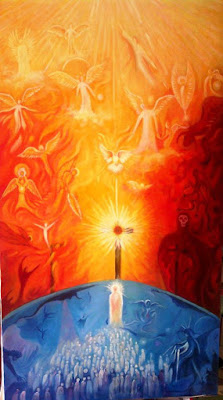June Trinity
John 11: 17-44
When Jesus got [to Bethany] there, he found that he [Lazarus] had already been in the tomb for four days. Bethany was near Jerusalem, about two miles away. Many Jews had come to Martha and Mary to console them about their brother. When Martha heard that Jesus was coming, she went to meet him. But Mary remained within. And Martha said to Jesus, “Lord, if you had been here, my brother would not have died. But I know that even now God will give you whatever you ask.
Jesus said to her, “Your brother will rise again.”
Then Jesus said to her, “I AM the resurrection and the life. Whoever fills himself with my power through faith, he will live even when he dies; and whoever takes me into himself as his life, he is set free from the might of death in all earthly cycles of time. Do you feel the truth of these words?”
And she said, “Yes Lord. With my heart I have recognized that you are the Christ, the Son of God, who is coming into the world.”
When she had said this she went and called her sister Mary and said to her privately, “The Master is here and is asking for you.” Jesus had not yet entered the town. He had stayed in the place where Martha had met him.
When the Jews who were with her in the house, consoling her, saw Mary get up quickly and go out, they followed her. They thought she was going to the tomb to weep there. But Mary came to the place where Jesus was, and when she saw him, she fell at his feet and said to him, “Lord, if you had been there, this brother of mine would not have died. “
When Jesus saw how she and the Jews coming with her were weeping, he aroused himself in spirit and, deeply moved within himself, he asked, “Where have you laid him?”
They answered, “Come, Lord, and see.”
Jesus wept. Then the Jews said, “See how he loved him.” But some of them said, “Could not he who restored the sight of the blind man keep this man from dying?”
And again Jesus, deeply moved within himself went up to the tomb.
It was a cave, and a stone lay across it. And Jesus said, “Take away the stone!”
Then said Martha, the sister of him whose life had reached completion, “Lord, there will be an odor [he has already begun to decompose], for this is the fourth day.”
But Jesus said, “Did I not say to you that if you had faith, you would see the revelation of God?”
Then they took away the stone. And Jesus lifted up his eyes to the spirit and said, “Father, I thank you that you have heard me. I knew that you always hear me; but because of the people standing here I say it, so that their hearts may know that you have sent me. Then he called with a loud voice: “Lazarus, come out!”
And the dead man came out, his feet and hands bound with strips of linen, his face covered with a veil. And Jesus said, “Unbind him, and let him go.”
June 12, 2016
John 11: 17-44
By now the fruit trees have long since blossomed and dropped their petals. Yet hidden in the green leaves, the small fruits continue to grow toward ripening. When they are ripe they, too, will fall; but preserved, even in their decay, are the seeds of future life.
Today’s reading is about falling into death. Christ says that even her, in death, there is continuing life. Taking in his life force, we will continue to live. In him is life and rebirth, even after death. The seeds of our lives are preserved in him. Ultimately we will all return. As Rilke says,
… we are never finished with our not dying
Dying is strange and hard
If it is not our death, but a death
That takes us by storm, when we’ve ripened none
Within us.
We stand in your garden year after year.
We are trees for yielding a sweet death.
But fearful, we wither before the harvest.[1]
God, give us each our own death,
The dying that proceeds
From each of our lives:
The way we loved,
The meanings we made…[2]






